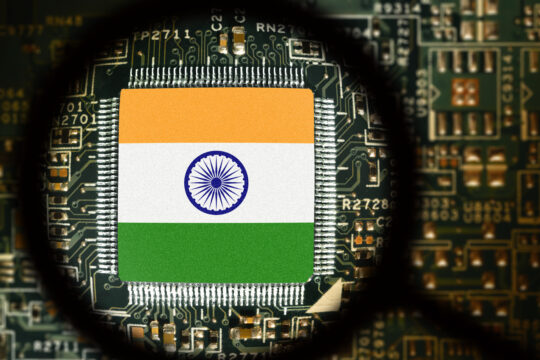Artificial Intelligence (AI) is going to be big in every facet of our lives now. Then why not healthcare? Imagine walking into a clinic, where the doctor greets you with a mechanical namaste. It would be cool, but impossible you say? Maybe not now, but in the not-so-distant future, who knows?
In January this year, the Center for Internet and Society (CIS), India, published a report, “Artificial Intelligence in the Healthcare Industry in India.” According to this report, Investment in AI in the healthcare sector in India is rising, seeing that this sector has a lot to develop. “From the $5.5 billion raised by global digital healthcare companies in the July-September 2017 quarter, at least 16 Indian healthcare IT companies received funding,” the report said.
AI extends a helping hand to the healthcare domain not just in performing medical administration tasks and application, but also in training medical professionals. Also, the use of AI is leading to more satisfied patients and lower costs. Moreover, demand for precision medicine, more and more cross-industry partnerships, and rising venture capital investments in AI healthcare, are all leading to increased use of AI in healthcare.
On the other hand, AI undeniably indicates faster calculations and lesser power consumption. Also, now that the internet is an undeniable part of our lifestyle, and more and more people are using connected devices, AI is starting to make a lot of sense. AI-enabled tools can also help less-skilled professionals in difficult decision making. Examples are mental health assistant applications such as, Wysa, a chatbot that escalates a case when needed.
The market research firm, ReportnReports, created a report “Artificial Intelligence in Healthcare Market by Offering (Hardware, Software and Services), Technology (Deep Learning, Querying Method, NLP, and Context Aware Processing), Application, End-User Industry, and Geography – Global Forecast to 2022”. Extracts from the report say that AI in healthcare is rising at a Compound Annual Growth Rate (CAGR) of 52.68% and is likely to reach USD 7,988.8 million by 2022. One of the reasons cited is that Big Data is being used more and more in the healthcare industry.
According to the ReportnReports, North America will register the highest growth rate in use of AI in healthcare. Companies that are dipping into the AI pool in the healthcare sector are IBM Corporation (US), Intel Corporation (US), Google, Inc. (US), Microsoft Corporation (US) and many more.
The Indian healthcare market is looking at an amount such as $100 billion in 2016 to $280 billion in 2020. Health-tech companies can look forward to a lot of business opportunity, especially startups. Many startups have already brought forward AI technology that is contributing towards a smoothly functioning healthcare system.
Many Indian state governments are supporting AI startups. Reports say the Karnataka government has plans to assemble Rs2000 crores by 2020 to be used for AI startups. Its Startup Policy and Karnataka Information Technology Venture Capital Fund are helping towards the same. On the path to a better nation, AI in healthcare cannot be ignored because it would only add to cost management, quality of healthcare, and outreach. It is no wonder that support is coming from the likes of FICCI, and the Prime Minister’s Office.
As The Tech Panda reported in the article, “Startups use tech to challenge India’s healthcare deficit,” several startups, such as Neurosynaptic and A3RMT, have come up with helpful AI-based apps. Many other startups have been presenting revolutionary ideas in the field of AI in healthcare in India. Bengaluru-based Niramai is a software to detect breast cancer. While MUrgency is mobile app that connects a person in emergency with the nearest medical facility. Another mobile app is Curill, which advises intelligently on medical health. Noida-based Advancells attempts to lower costs for stem cell therapy, and Bengaluru-based Portea provides hospital-quality care at home. Also, Bengaluru-based AddressHealth helps monitor children’s health, while LiveHealth helps manage digital medical data for individuals as well as diagnostic centers.
However, there is still time till AI is fully accepted into healthcare. Many healthcare professionals resist the use of AI-based technologies, and the vagueness of the regulations that apply to medical software often pull AI back. A fear that medical professionals often have in India is that AI could replace them, which is why assistive AI is more likely to succeed in India.
As the CIS report states, “From a review of AI and health solutions, reports, and news items in India, the focus of most AI-based healthcare initiatives in India has been to extend medical services to traditionally underserved populations in India such as rural areas that do not have the required infrastructure or enough primary physicians, and economically weaker sections of society who may not be able to afford certain medical facilities. Therefore, AI as it is used in healthcare in India appears to be addressing issues of economic disparity rather than widening existing gaps.”
AI also helps address the issue of more patients than healthcare professionals. It’s a known fact in India, that while patients are in overwhelming numbers, healthcare professionals are always short. As Dr. Vivek Sharma spoke to The Tech Panda, “There should be at least one doctor for every 1,000 people, in India, it’s one doctor for 1,700 people. And this problem is compounded by the fact that the distribution of healthcare is skewed. As you go from urban areas to rural areas the availability of healthcare becomes very poor.”












